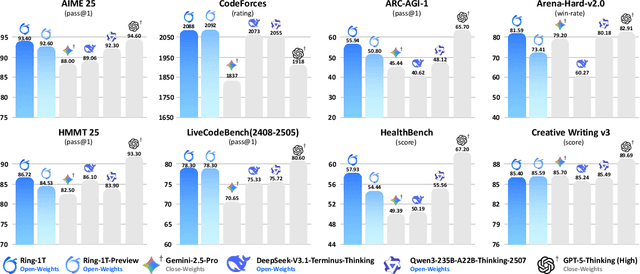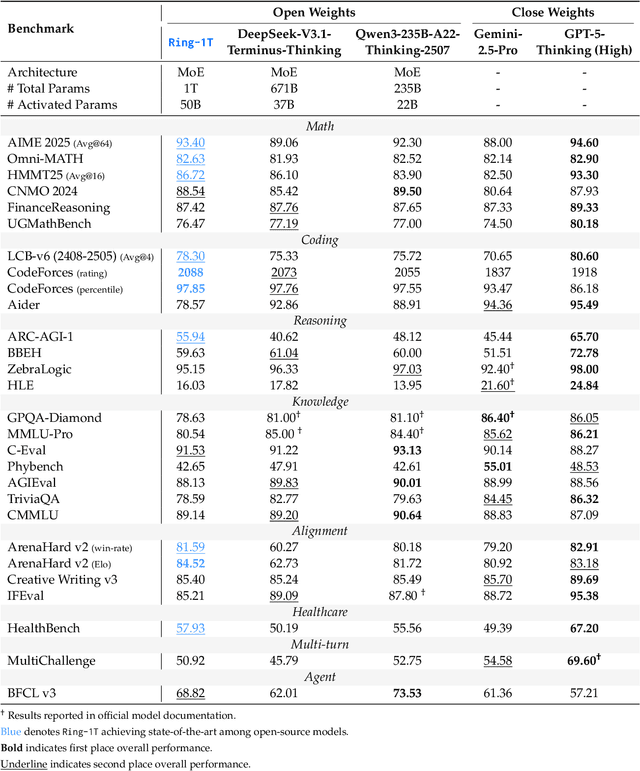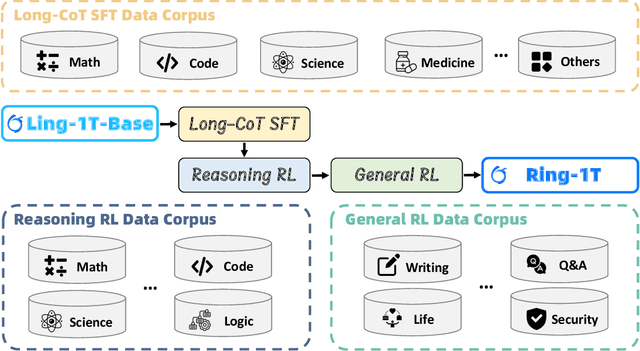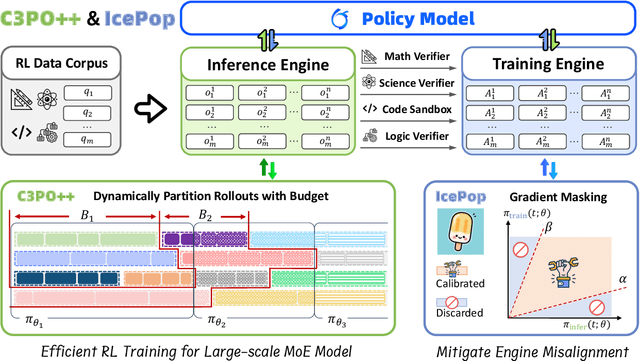Yongzhen Guo
Every Step Evolves: Scaling Reinforcement Learning for Trillion-Scale Thinking Model
Oct 21, 2025



Abstract:We present Ring-1T, the first open-source, state-of-the-art thinking model with a trillion-scale parameter. It features 1 trillion total parameters and activates approximately 50 billion per token. Training such models at a trillion-parameter scale introduces unprecedented challenges, including train-inference misalignment, inefficiencies in rollout processing, and bottlenecks in the RL system. To address these, we pioneer three interconnected innovations: (1) IcePop stabilizes RL training via token-level discrepancy masking and clipping, resolving instability from training-inference mismatches; (2) C3PO++ improves resource utilization for long rollouts under a token budget by dynamically partitioning them, thereby obtaining high time efficiency; and (3) ASystem, a high-performance RL framework designed to overcome the systemic bottlenecks that impede trillion-parameter model training. Ring-1T delivers breakthrough results across critical benchmarks: 93.4 on AIME-2025, 86.72 on HMMT-2025, 2088 on CodeForces, and 55.94 on ARC-AGI-v1. Notably, it attains a silver medal-level result on the IMO-2025, underscoring its exceptional reasoning capabilities. By releasing the complete 1T parameter MoE model to the community, we provide the research community with direct access to cutting-edge reasoning capabilities. This contribution marks a significant milestone in democratizing large-scale reasoning intelligence and establishes a new baseline for open-source model performance.
Every FLOP Counts: Scaling a 300B Mixture-of-Experts LING LLM without Premium GPUs
Mar 07, 2025



Abstract:In this technical report, we tackle the challenges of training large-scale Mixture of Experts (MoE) models, focusing on overcoming cost inefficiency and resource limitations prevalent in such systems. To address these issues, we present two differently sized MoE large language models (LLMs), namely Ling-Lite and Ling-Plus (referred to as "Bailing" in Chinese, spelled B\v{a}il\'ing in Pinyin). Ling-Lite contains 16.8 billion parameters with 2.75 billion activated parameters, while Ling-Plus boasts 290 billion parameters with 28.8 billion activated parameters. Both models exhibit comparable performance to leading industry benchmarks. This report offers actionable insights to improve the efficiency and accessibility of AI development in resource-constrained settings, promoting more scalable and sustainable technologies. Specifically, to reduce training costs for large-scale MoE models, we propose innovative methods for (1) optimization of model architecture and training processes, (2) refinement of training anomaly handling, and (3) enhancement of model evaluation efficiency. Additionally, leveraging high-quality data generated from knowledge graphs, our models demonstrate superior capabilities in tool use compared to other models. Ultimately, our experimental findings demonstrate that a 300B MoE LLM can be effectively trained on lower-performance devices while achieving comparable performance to models of a similar scale, including dense and MoE models. Compared to high-performance devices, utilizing a lower-specification hardware system during the pre-training phase demonstrates significant cost savings, reducing computing costs by approximately 20%. The models can be accessed at https://huggingface.co/inclusionAI.
MathClean: A Benchmark for Synthetic Mathematical Data Cleaning
Feb 26, 2025



Abstract:With the rapid development of large language models (LLMs), the quality of training data has become crucial. Among the various types of training data, mathematical data plays a key role in enabling LLMs to acquire strong reasoning abilities. While high-quality open-source data is important, it is often insufficient for pre-training, necessitating the addition of synthetic math problems. However, synthetic math questions and answers can introduce inaccuracies, which may degrade both the training data and web data. Therefore, an effective method for cleaning synthetic math data is essential. In this paper, we propose the MathClean benchmark to evaluate the effectiveness of math data cleaning models. The MathClean benchmark consists of 2,000 correct questions and 2,000 erroneous questions with additional 2,000 correct and erroneous answers sourced from augmented data based on GSM8K and MATH. Moreover, we also annotate error types for each question or answer, since it can assess whether models can correctly identify the error categories for future improvements. Finally, we present comprehensive evaluations using state-of-the-art (SOTA) models. Our results demonstrate that even strong models like GPT-o1 and DeepSeek-R1 perform poorly on this benchmark, highlighting the utility of MathClean. Our code and data is available at https://github.com/YuYingLi0/MathClean.
Trans4D: Realistic Geometry-Aware Transition for Compositional Text-to-4D Synthesis
Oct 09, 2024Abstract:Recent advances in diffusion models have demonstrated exceptional capabilities in image and video generation, further improving the effectiveness of 4D synthesis. Existing 4D generation methods can generate high-quality 4D objects or scenes based on user-friendly conditions, benefiting the gaming and video industries. However, these methods struggle to synthesize significant object deformation of complex 4D transitions and interactions within scenes. To address this challenge, we propose Trans4D, a novel text-to-4D synthesis framework that enables realistic complex scene transitions. Specifically, we first use multi-modal large language models (MLLMs) to produce a physic-aware scene description for 4D scene initialization and effective transition timing planning. Then we propose a geometry-aware 4D transition network to realize a complex scene-level 4D transition based on the plan, which involves expressive geometrical object deformation. Extensive experiments demonstrate that Trans4D consistently outperforms existing state-of-the-art methods in generating 4D scenes with accurate and high-quality transitions, validating its effectiveness. Code: https://github.com/YangLing0818/Trans4D
 Add to Chrome
Add to Chrome Add to Firefox
Add to Firefox Add to Edge
Add to Edge